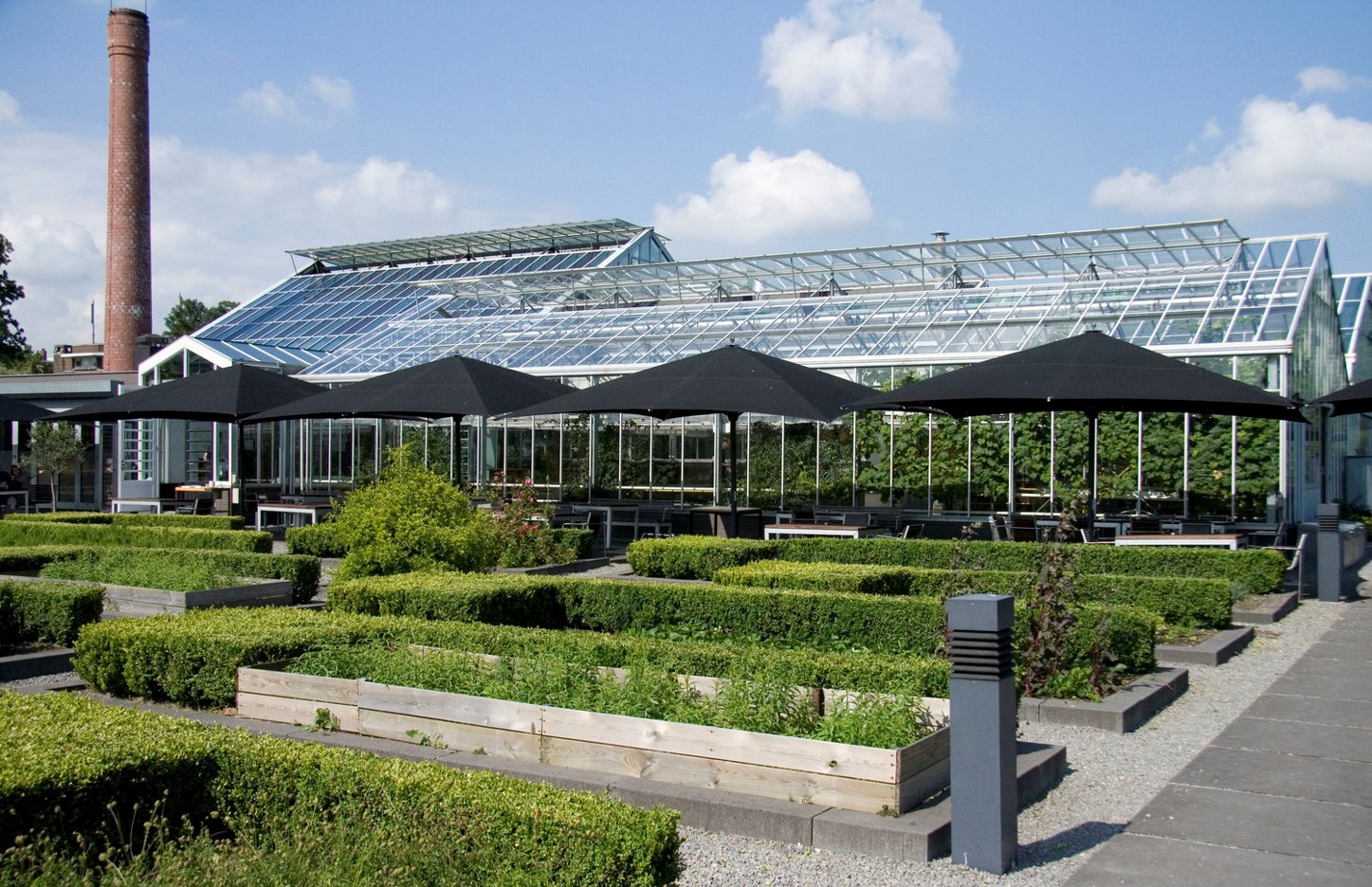Geen bewerkingssamenvatting |
k (Tekst vervangen - "{{Project" door " {{Project") |
||
| (Een tussenliggende versie door een andere gebruiker niet weergegeven) | |||
| Regel 1: | Regel 1: | ||
==== | == Facts == | ||
* Country: Netherlands | |||
* Type of provider: Restaurant | |||
* Focus: | |||
** Refuse: Consideration has been given to do everything as locally as possible, so that many steps can be skipped compared to a normal process. No transport of raw materials or products and no packaging materials. | |||
** Reduce: Little waste because they only extract the products they need from the ground. | |||
** Reuse: The product, the greenhouse, is used for a new purpose. First as a greenhouse and then as a restaurant. | |||
** Remanufacture: The greenhouse from the past is partly reused for the new greenhouse, the beams have been preserved and the chimney. | |||
== Summary of the project == | |||
The original greenhouse was built in 1927 to provide other parks in the city with trees, grasses and exotic species such as bananas and palms. At the end of the 20th century, demand had declined and the greenhouse was no longer in use. In 2000 the greenhouse was given a new function and it became a restaurant. The greenhouse has been rebuilt, the beams of the old greenhouse remained intact. | The original greenhouse was built in 1927 to provide other parks in the city with trees, grasses and exotic species such as bananas and palms. At the end of the 20th century, demand had declined and the greenhouse was no longer in use. In 2000 the greenhouse was given a new function and it became a restaurant. The greenhouse has been rebuilt, the beams of the old greenhouse remained intact. | ||
| Regel 6: | Regel 15: | ||
They work locally with local farmers, they use the produce from the gardens and from the land fresh in the restaurant. As a result, money is saved on transport, they have little waste because they only extract the products they need from the ground and they don't have to pack it for transport. They grow everything as naturally as possible. | They work locally with local farmers, they use the produce from the gardens and from the land fresh in the restaurant. As a result, money is saved on transport, they have little waste because they only extract the products they need from the ground and they don't have to pack it for transport. They grow everything as naturally as possible. | ||
== | == More information == | ||
Do you want to know more about this organization? Please visit their website: https://restaurantdekas.com/eng/about-de-kas | |||
Instagram: https://www.instagram.com/restaurantdekas/ | Instagram: https://www.instagram.com/restaurantdekas/ | ||
Facebook: https://www.facebook.com/restaurantdekas/ | Facebook: https://www.facebook.com/restaurantdekas/<nowiki/> | ||
{{Project FACET Practice config}} | {{Project FACET Practice config}} | ||
{{Project | {{Project | ||
|Name=From plant to plate | |Name=From plant to plate | ||
| Regel 49: | Regel 41: | ||
|Show title=Nee | |Show title=Nee | ||
}} | }} | ||
{{Project FACET Practice additional | {{Project FACET Practice additional | ||
|Theme=Waste management | |Theme=Waste management | ||
Huidige versie van 25 mrt 2024 om 10:51
Facts
- Country: Netherlands
- Type of provider: Restaurant
- Focus:
- Refuse: Consideration has been given to do everything as locally as possible, so that many steps can be skipped compared to a normal process. No transport of raw materials or products and no packaging materials.
- Reduce: Little waste because they only extract the products they need from the ground.
- Reuse: The product, the greenhouse, is used for a new purpose. First as a greenhouse and then as a restaurant.
- Remanufacture: The greenhouse from the past is partly reused for the new greenhouse, the beams have been preserved and the chimney.
Summary of the project
The original greenhouse was built in 1927 to provide other parks in the city with trees, grasses and exotic species such as bananas and palms. At the end of the 20th century, demand had declined and the greenhouse was no longer in use. In 2000 the greenhouse was given a new function and it became a restaurant. The greenhouse has been rebuilt, the beams of the old greenhouse remained intact.
The restaurant is in the greenhouse and gets the products from there. They get the inspiration for the menu from the fresh products, they sow, harvest, hoe, water everything themselves. They grow 300 types of vegetables, fruits and herbs.
They work locally with local farmers, they use the produce from the gardens and from the land fresh in the restaurant. As a result, money is saved on transport, they have little waste because they only extract the products they need from the ground and they don't have to pack it for transport. They grow everything as naturally as possible.
More information
Do you want to know more about this organization? Please visit their website: https://restaurantdekas.com/eng/about-de-kas Instagram: https://www.instagram.com/restaurantdekas/
Facebook: https://www.facebook.com/restaurantdekas/

